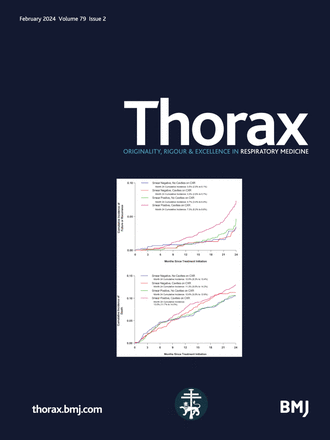Smart steps forward: the role of wearables in long-term rehabilitation after lung transplantation
IF 7.7
1区 医学
Q1 RESPIRATORY SYSTEM
引用次数: 0
Abstract
Physical inactivity is a modifiable and widespread risk factor in chronic disease populations, including those with obstructive pulmonary disease and recipients of lung transplantation (LT). While LT restores respiratory function, full physical recovery remains elusive. Muscle weakness and reduced exercise tolerance are common and often worsened by immunosuppressive therapies, immobility and nutritional deficits.1 Notably, prolonged sedentary behaviour is independently associated with long-term morbidity and mortality,1 2 even among patients meeting activity recommendations.3 The COVID-19 pandemic accelerated telemedicine integration into clinical practice, expanding opportunities for telerehabilitation and digital health interventions. In this context, consumer-grade wearable devices, like Fitbit wristbands (Fitbit, Google Alphabet, California, USA), originally designed for fitness tracking, are increasingly being evaluated as therapeutic tools in chronic disease populations.4 Against this backdrop, the randomised controlled trial by Breuls et al ,5 recently published in Thorax, is timely. It explores the use of wearable-based, long-term telecoaching in a high-risk, deconditioned post-LT population with low baseline activity levels. This marks a crucial shift from traditional short-term, centre-based rehabilitation to sustained, behaviourally driven, patient-centred care, addressing the persistent deconditioning that often characterises long-term recovery.1 6 Wearable technologies are emerging as scalable,7 low-cost tools that support behavioural interventions4 through real-time feedback,7 individualised coaching, social connectivity and remote monitoring (figure …智能向前迈进:可穿戴设备在肺移植术后长期康复中的作用
在慢性疾病人群中,缺乏身体活动是一个可改变的、广泛存在的危险因素,包括那些患有阻塞性肺病和肺移植(LT)的人群。虽然LT可以恢复呼吸功能,但完全的身体恢复仍然是难以捉摸的。肌肉无力和运动耐受性降低是常见的,并且经常因免疫抑制疗法、不活动和营养缺乏而恶化值得注意的是,长时间的久坐行为与长期发病率和死亡率独立相关,即使在符合运动建议的患者中也是如此2019冠状病毒病大流行加速了远程医疗融入临床实践,扩大了远程康复和数字卫生干预的机会。在这种背景下,消费级可穿戴设备,如Fitbit腕带(Fitbit,谷歌Alphabet, California, USA),最初设计用于健身跟踪,越来越多地被评估为慢性疾病人群的治疗工具在这种背景下,Breuls等人最近发表在Thorax杂志上的随机对照试验是及时的。它探讨了在低基线活动水平的高风险、条件不佳的lt后人群中使用基于可穿戴设备的长期远程教学。这标志着从传统的短期、以中心为基础的康复到持续的、行为驱动的、以患者为中心的护理的重大转变,解决了长期康复中经常出现的持续去条件化问题。可穿戴技术正在成为可扩展的、低成本的工具,通过实时反馈、个性化指导、社交连接和远程监控来支持行为干预。
本文章由计算机程序翻译,如有差异,请以英文原文为准。
求助全文
约1分钟内获得全文
求助全文
来源期刊

Thorax
医学-呼吸系统
CiteScore
16.10
自引率
2.00%
发文量
197
审稿时长
1 months
期刊介绍:
Thorax stands as one of the premier respiratory medicine journals globally, featuring clinical and experimental research articles spanning respiratory medicine, pediatrics, immunology, pharmacology, pathology, and surgery. The journal's mission is to publish noteworthy advancements in scientific understanding that are poised to influence clinical practice significantly. This encompasses articles delving into basic and translational mechanisms applicable to clinical material, covering areas such as cell and molecular biology, genetics, epidemiology, and immunology.
 求助内容:
求助内容: 应助结果提醒方式:
应助结果提醒方式:


